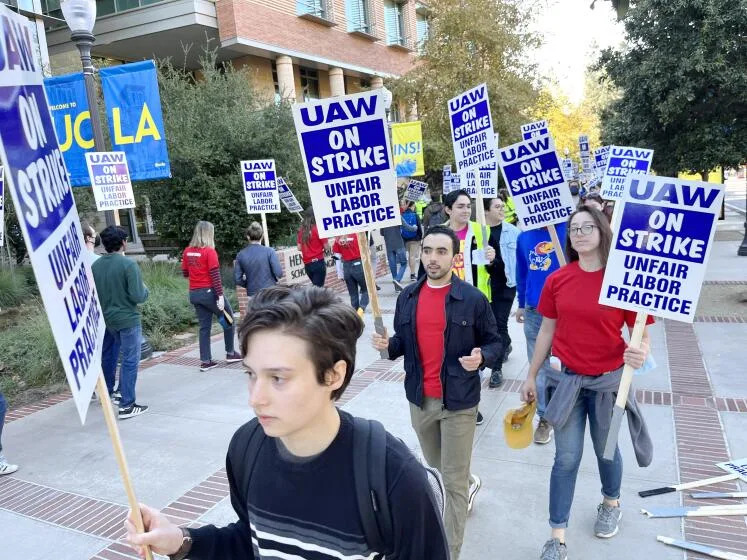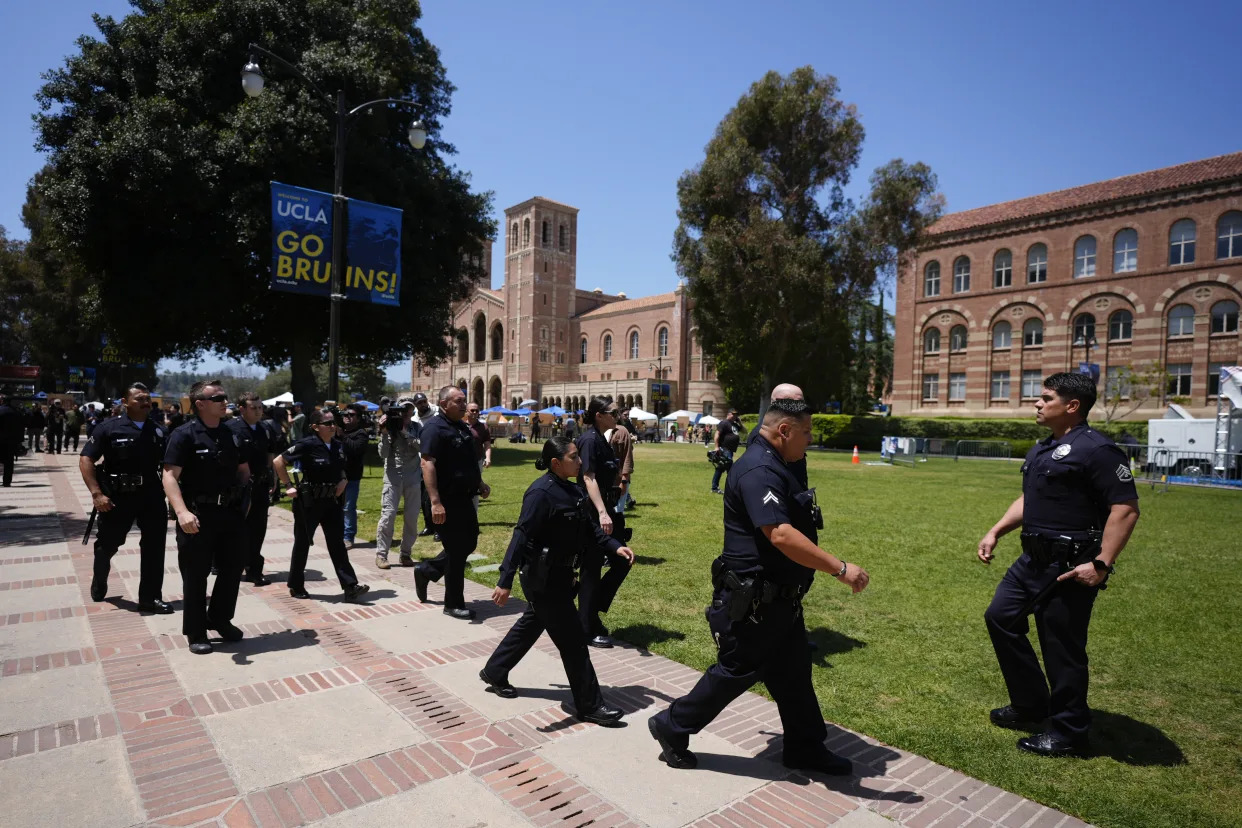Jaweed Kaleem, Suhauna Hussain
Wed, May 15, 2024

Unionized UC academic workers picket in November 2022. Members of United Auto Workers Local 4811 authorized a strike Wednesday, alleging that their rights were violated by actions against pro-Palestinian protests. (Christina House / Los Angeles Times)
The union representing 48,000 graduate student teaching assistants, researchers and other student workers across the University of California’s 10 campuses has voted to authorize a strike and cause "maximum chaos," alleging that its workers' rights have been violated at several universities by actions against pro-Palestinian protests, union leaders announced Wednesday evening.
The walkouts, which are still being planned, were approved by 79% of the 19,780 members of the United Auto Workers Local 4811 who voted. The strike vote comes as campuses throughout the UC system have been roiled by tensions and protests over the Israel-Hamas war, including a violent mob attack on a pro-Palestinian encampment at UCLA.
Though the vote gives the union permission to strike as soon as Wednesday night, it was unclear when or where the walkouts would occur. The union represents teaching assistants, tutors, researchers and postdoctoral scholars.
The union rebuked UCLA, UC San Diego and UC Irvine for crackdowns on pro-Palestinian student protesters. On Wednesday evening, scores of police officers in riot gear were moving on pro-Palestinian demonstrators at UCI who occupied and barricaded the physical sciences lecture hall.
Rafael Jaime, the union’s co-president and a PhD candidate in UCLA’s English department, said the goal would be to “maximize chaos and confusion” at universities where the union alleges officials have violated workers' rights over workplace conditions during student protests against the Israel-Hamas war.
“Our members have been beaten, concussed, pepper sprayed, both by counter-protesters and by police forces. As a union, it is our responsibility to stand beside them,” the union said in a statement. "In order to de-escalate the situation, UC must substantively engage with the concerns raised by the protesters — which focus on UC’s investments in companies and industries profiting off of the suffering in Gaza."
In a letter sent to graduate student workers on Wednesday, the University of California warned students against striking.
"The University’s position is that the Union’s strike is unlawful, and as a result, a work stoppage is not protected strike activity. This means that participating in the strike does not change, excuse, or modify, an employee’s normal work duties or expectations. And, unlike a protected strike, you could be subject to corrective action for failing to perform your duties," the unsigned letter from the office of the president said.
The academic worker strike would be modeled after last year's "stand up" strikes at against Ford, Stellantis and General Motors and similar to recent strikes at Southern California hotels. The walkouts would not target all campuses at once, Jaime said, but one by one based on how receptive administrations are to pro-Palestinian activists.
UC Riverside and UC Berkeley have reached agreements with protesters to end encampments and explore divestment from weapons companies. Leaders at those universities have rejected calls to target Israel specifically or for academic boycotts against exchange programs and partnerships with Israeli universities.
While some Jewish students have supported pro-Palestinian protests, national Jewish groups have criticized the divestment push, saying it is antisemitic because it aims to delegitimize the only predominantly Jewish nation.
Union members began casting their ballots online Monday. The strikes, Jaime said, could run for any length of time through the end of June. The period covers a critical moment on campuses during finals and commencement exercises.
In November and December 2022, the union walked our for six weeks, winning significant improvements in wages and working conditions and energizing a surge of union activism among academic workers across the nation.
Before the strike vote results came out, the University of California said the union was inappropriately flexing its muscle on a political issue.
Read more: UCLA chancellor faces growing faculty criticism, no-confidence vote, after weeks of turmoil
"UC believes that the vote currently being conducted by UAW leadership sets a dangerous precedent that would introduce non-labor issues into labor agreements," said UC Office of the President spokeswoman Heather Hansen.
The disagreement hinges on whether student workers such as Jaime, who was part of pro-Palestinian protests at UCLA the night a violent mob attacked the encampment, are striking over a "workplace issue or political speech," said John Logan, a professor in the department of labor and employment studies at San Francisco State University.
"The contract between UAW and UC does include language on academic freedom, but the university could say, 'Yes, speech is protected, but the actions you engaged in go far beyond speech, preventing students from getting into [a] library or other campus [areas] that are not protected,'" Logan said.
Another challenge was turnout. Pro-Palestinian activism has touched every UC campus, but it has been stronger at those in or near big cities. A union referendum last year in support of a permanent cease-fire in the Israel-Hamas war and divestment passed by 90%, but received fewer than 6,000 total votes. The most recent contract ratification had more than 36,000 votes. Turnout for the strike vote was high but less than the contract ratification.
As college presidents across the country have faced criticism for calling in police in riot gear to clear pro-Palestinian encampments, the move to threaten a strike is one of the biggest actions by an American labor union in support of Palestinians.
The vote came after the union filed charges with the state labor board over arrests of pro-Palestinian graduate student protesters at UCLA and suspensions and other discipline at UC San Diego and UC Irvine, accusing the universities of retaliating against student workers and unlawfully changing workplace policies to suppress pro-Palestinian speech.
The universities have broadly said they were attempting to ensure safe campus environments while respecting free speech rights. Internal and external investigations are underway at UCLA.
Some members said they believed the union's criticism of the campus protest crackdown did not go far enough. Many student protesters have called for campus police to be defunded or for universities to vow to never again call municipal police to campus. The union did not include those in its strike-related demands.
"It's really disappointing to me as a Black person that the union did not take a strong stance on policing and racial profiling on campus," said Gene McAdoo, a doctoral student in the UCLA School of Education and Information Studies. "They portray themselves as radical, yet aren't on this issue."
McAdoo still voted in support, he said, because "withholding our labor gives us a lot of power and leverage to push the UC administration to meet [Students for Justice in Palestine] demands for divestment. That is the ultimate goal of this movement. But I also know that there is an undercurrent of folks who are still pushing for cops off campus."
It’s not the first time UAW workers have pushed for divestment. In 1973, Arab American workers in Detroit auto plants walked off the job in protest of the UAW’s investment in Israeli bonds.
But for a union to vote on a strike while a contract is in place is "unheard of in modern times,” said Jeff Schuhrke, a labor historian who teaches at SUNY Empire State University.
While the union demands on academic freedom, free speech and protection from violence could arguably center on workplace conditions, they also explicitly support protesters' calls for divestment from weapons manufacturers and other companies profiting from Israel's war in Gaza.
The strike vote "is not about economics. It’s not about a raise, or more benefits. It’s political,” Schuhrke said.
The professor said that harked back to the origins of the student labor movement, when the first graduate unions formed in the 1960s during the campus free speech and antiwar movements.
AFT Local 1570, a union of teaching assistants formed at UC Berkeley in the throes of the campus free speech movement, voted in 1966 to strike against the University of California in response to police arresting students conducting a sit-in around a U.S. Navy recruitment table on campus.
The Teaching Assistants’ Assn. at University of Wisconsin-Madison, which grew out of the anti-draft sit-in and campus demonstrations against Dow Chemical for its role in production of napalm and other weapons for the Vietnam War, is the oldest still-existing graduate union in the U.S.
"The graduate union movement is coming full circle," Schuhrke said.
This story originally appeared in Los Angeles Times.
University of California student workers vote to strike amid Gaza protest furor
Nick Niedzwiadek
Wed, May 15, 2024

Thousands of unionized student workers across California’s premier public universities on Wednesday blessed a potential strike in the aftermath of crackdowns on recent campus protests.
Of the 19,780 votes cast by members of a local unit of the Unite Auto Workers, about 79 percent were in favor of authorizing a strike, easily clearing the two-thirds threshold necessary.
Earlier this week graduate students, teaching assistants and post-docs represented by UAW Local 4811 began voting to authorize a work stoppage in response to labor violations allegedly committed by university officials amid the turbulence earlier this spring. Among their demands is amnesty for students and faculty members arrested during the unrest.
“At the heart of this is our right to free speech and peaceful protest,” UAW 4811 President Rafael Jaime, who is also a PhD student in the UCLA English Department, said in a release. “If members of the academic community are maced and beaten down for peacefully demonstrating on this issue, our ability to speak up on all issues is threatened."
Beyond the prospect of work stoppages, labor unions that represent members at a host of colleges including the University of Southern California and UCLA have filed unfair labor practice charges alleging that officials violated workers’ rights in the process of shutting down pro-Palestinian encampments and other demonstrations this spring.
Nationally, the UAW was ahead of many other unions in calling for a ceasefire between Israel and Hamas, and much of its membership growth in recent years has been by organizing grad students and other campus workers — putting it at the vanguard of recent labor clashes with college administrators struggling to control protests over Israel’s war against Hamas.
Union President Shawn Fain spoke out against universities’ forceful response two weeks ago, saying that if they “can’t take the outcry, stop supporting the war.”
The local unit has not said when any stoppage would begin. Instead, it has sought to emulate the “stand-up” strategy UAW deployed to great effect in last year’s negotiations with a trio of U.S. car companies, in which individual units go on strike with little notice — allowing leadership to dial up pressure over time rather than everyone stopping work at once.
The student workers would deploy the same strategy campus by campus, at the direction of the union's executive board.
At the same time, with spring terms recently ended, a work stoppage over the summer months may be less of a blow to universities. In an explanatory post, the union said a "strike will go on no longer than June 30th."
The union has issued a series of demands to UC leadership — ranging from the amnesty to divesting from defense companies with ties to Israel — to head off a strike. However, it’s doubtful that officials are willing to negotiate on such issues.
“UC believes that a strike sets a dangerous precedent that would introduce non-labor issues into labor agreements.,” a spokesperson said in a statement.
“While we acknowledge the profoundly troubling issues about the ongoing conflict in the Middle East and understand their impact on our students and employees, the University maintains that these issues fall outside the scope of negotiation for employment and the implementation of existing labor contracts.
No comments:
Post a Comment